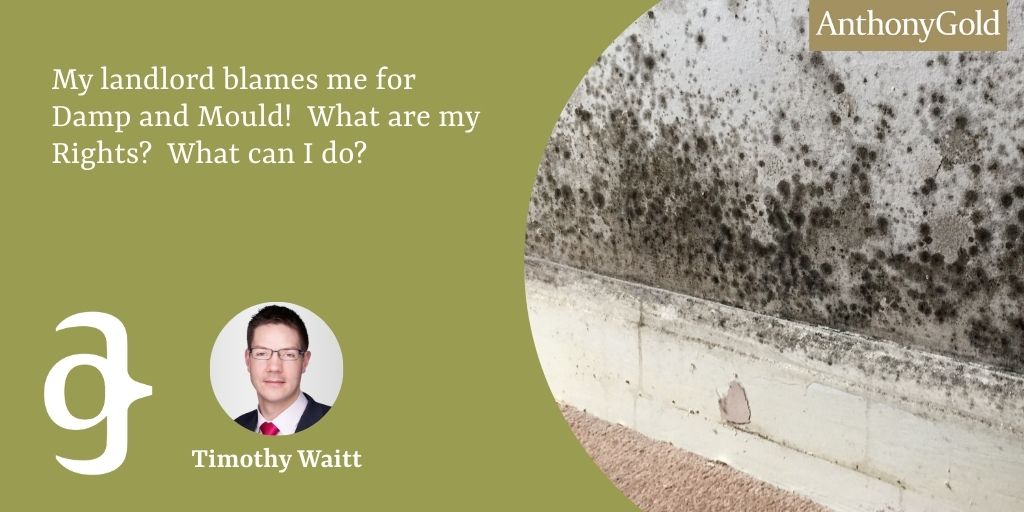My landlord blames me for Damp and Mould! What are my Rights? What can I do?

So you told your landlord about the damp and mould in your house. And they said that you weren’t…using the heating enough, opening the windows, using the extractor fans, you were drying washing on the radiators. You fill in the blank. Are they right? What can you do?
Damp and mould are often caused by condensation. It happens when warm moist air hits something cold, causing the moisture to condense out of the air. Picture the moisture on your cold drink on a summer’s day. The same principle applies to your house or flat.
Also Read: Landlord Refuses to Fix Damp in Apartment
We all breathe out about 5 litres of water a day and this can cause a damp and mould problem – but we shouldn’t stop breathing!
The house or flat should be designed to be able to handle our moisture. If your home was built or converted in the last 20 years it should not have a significant damp or mould problem. If it does, then something has gone wrong but with older houses or flats designed it may mean that there are problems.
Recent guidance from the government in direct response to the tragic death of Awaab Ishak in 2020, due to mould in his family home makes clear that:
…tenants should not be blamed for damp and mould. Damp and mould in the home are not the result of ‘lifestyle choices’, and it is the responsibility of landlords to identify and address the underlying causes of the problem, such as structural issues or inadequate ventilation.
It is important to remember that condensation damp and mould can be caused by leaks, heating problems or broken extractor fans. These issues will be causing much more of a problem than anything you are doing. The design of the building – lack of insulation, particularly cold areas -will collect condensation, and dampness and lead to mould.
Your landlord has a duty to repair and fix these sorts of issues under the tenancy agreement. Sorting out these problems will help to reduce mould problems – regardless of other issues. Your landlord also has a duty to ensure that the property is fit for habitation- and significant mould means that it won’t be fit. That means they might have to improve insulation and other design issues.
If your landlord refuses to fix these issues or keeps blaming you for the issues you can seek legal advice by calling us on 020 7940 4060 or emailing your query to mail@anthonygold.co.uk and we will do our best to assist you legally.
Whatever else is going on all occupiers need to use the facilities in our homes to avoid condensation leading to damp and mould.
If we don’t use the heating ever and don’t ventilate at all then we will probably have a problem with damp and mould, whatever the design of the property.
That’s why landlords often blame tenants for condensation problems and tell you to use the heating more and open the windows more.
But even if you do that you might still have a mould problem – because of an underlying issue which means the house can’t cope with modern-day living. And it is not reasonable to have the windows wide open and the heating on full.
What can you do?
There are a few ways to minimise condensation damp and mould issues:
1. Get the moisture out
Open trickle vents or the windows a little and make sure you use the extractor fans – especially in the bathroom and kitchen.
Also, shut the door to the bathroom and kitchen when you’re done. The fans will then suck the moisture outside, and it won’t drift into your bedroom or living room and cause mould.
No extractor fan? Ask for them. No trickle vents? Ask for them. These vents and fans enable ventilation without losing all the heat and for the fans, at low electric cost.
2. Keep warm
If you don’t use the heating you will probably get mould. I know that fuel bills are expensive but if you don’t heat the property it will have mould. My advice is to use the heating to keep warm and avoid mould.
It’s best to have the heating on and controlled by the thermostat so that the temperature doesn’t wildly vary. Having it on till you are too hot, off till you are too cold and on again will make condensation damp and mould worse, not better. It may also be more expensive.
It is far better to leave it on at a low temperature than putting it on for sudden bursts. It’s ok of course to have it off when you go out or at night. If the heating doesn’t work then tell your landlord. If it’s not effective, tell your landlord. Ask them to put it right.
3. Dry Your Clothes Indoors but Properly
First, drying clothes indoors of itself should not cause a major mould problem. But it might add to it.
Drying your wet clothes indoors can be tricky as it can release about 5 litres of water per load into the property. But what can you do – you have to dry your clothes!
I always advise dry washing in the bathroom with the door shut and the radiator and fan on. Then you get the moisture out.
Try not to dry your clothes on the radiators – because first, you make the property colder because the heat from the radiator doesn’t get out and second, you put warm moist air into the property which will just spread, instead of getting out.
Even if you are following this advice you might still have damp and mould problems. If the landlord doesn’t investigate and solve the problems Anthony Gold solicitors can advise on your rights and options.
It’s really important to remember to keep evidence of the damp and mould. The key here is timed and dated photos. You might find it useful to email them to yourself because phones get lost and broken. Complaints to your landlords or the agent are best followed up by text messages, WhatsApp or emails confirming the complaint and what the landlord proposed to do.
If your landlord refuses to fix these issues, you can seek legal advice by calling us on 020 7940 4060 or emailing your query to mail@anthonygold.co.uk and we will do our best to assist you legally. These details are also in the description below.
We offer a variety of funding solutions that we can discuss when you contact us, including Legal Aid.
Also Read: Are you struggling with health problems caused by damp and mould?

